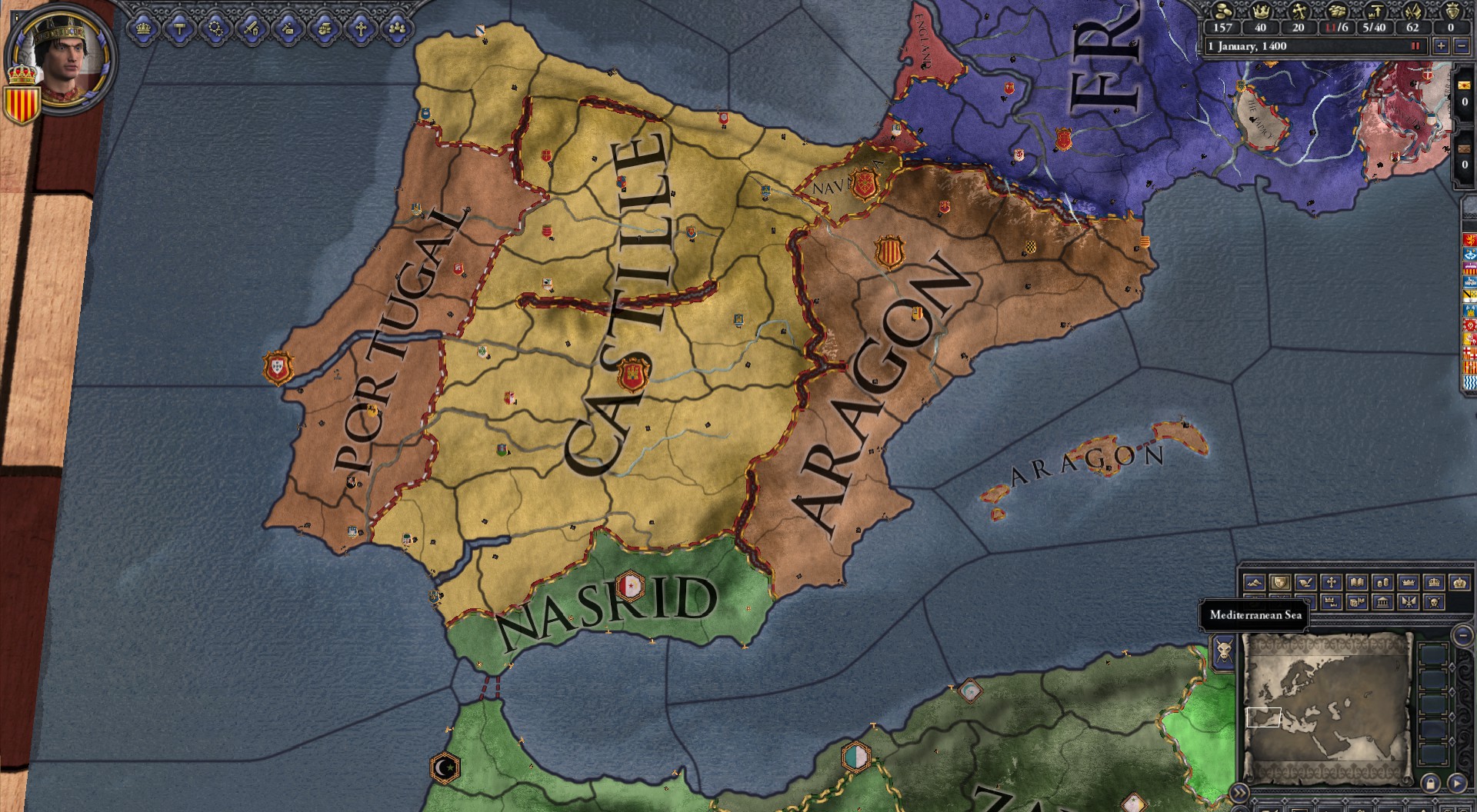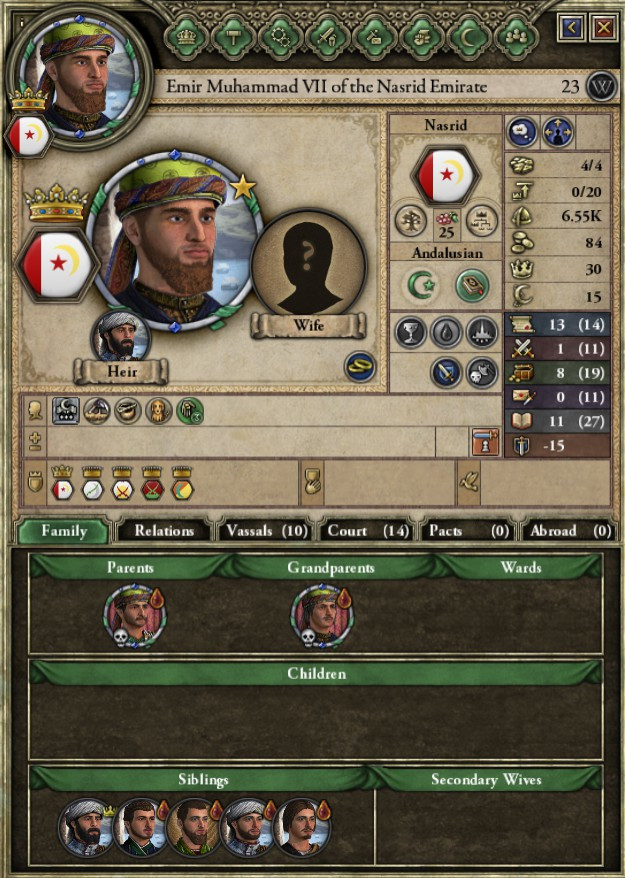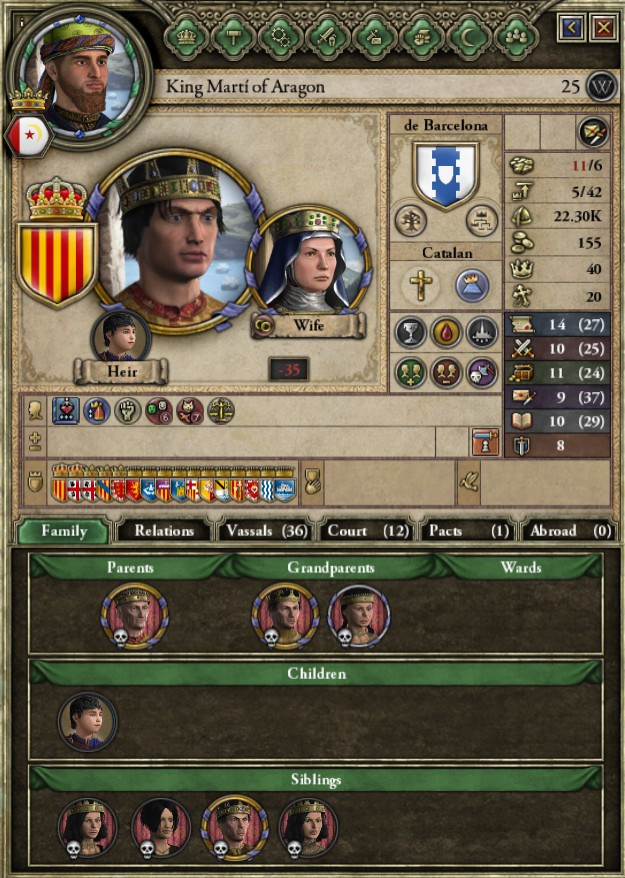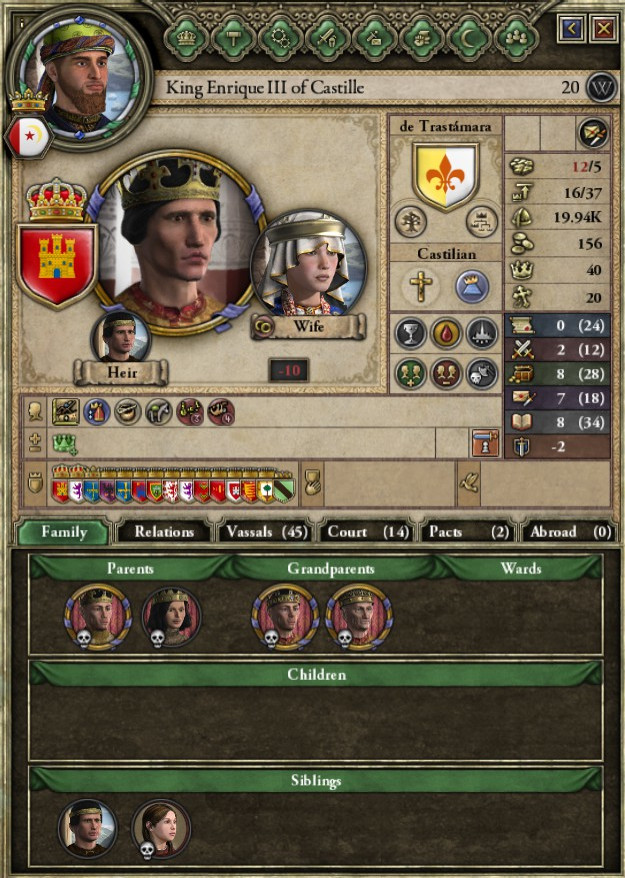After centuries of struggles, the Reconquista is almost complete. The Nasrid emirate of Granada clings on at the southern end of Iberia, acting as a gateway for Moors into Iberia, as well as having influence over the Marinid Sultanate to the south. Meanwhile, the Crown of Aragon maintains a small Mediterranean empire, with control over the Duchy of Mallorca and the island of Malta as well as holdings in Sardinia, currently dominated by the Judicate of Arborea. Furthermore, King Martí is married to Queen Maria of Trinacria (the island of Sicily). Castile, however, is the largest power in Iberia, stretching from the north coast to the south coast of the peninsula, ready to lead the remainder of the reconquista to victory. Portugal, on the other hand, is something of an outlier. The kingdom is surrounded by the more powerful Castile, and has no de jure claim to land around it. However, nothing is certain in this world, and, under the guidance of a shrewd king, Portugal could well become the most prominent power in Iberia.
Oh, and Navarra exists.

CK2 already has a reconquista mechanic, which means that once the Nasrid emirate is defeated by its Catholic neighbours- if indeed it is- there will be enough flavour as it is. By 1400, only two reconquista CBs remain: Seville and Granada. Two wars to end centuries of bloodshed over Iberia. But with the Moors defeated, where will the Iberia powers turn to next? If the Marinid Sultanate to the south is still weak, you may seize the initiative and press further into former Christian territory of the Roman Empire. The Reconquista may be over for those who simply seek security at home, but more zealous rulers will recognise that this is only the beginning. On the other hand, the Catholic kingdoms may turn on each other instead. With Catholicism's position secure, they will be free to vie for control of the peninsula themselves. Who will emerge victorious? Who will be proclaimed Emperor of all Hispania? Or will the peninsula devolve into internecine warfare, leaving its kingdoms weakened and vulnerable to an attack from the Moors, reenergised and full of zealous rage?

Emir Muhammad VII of Granada
As the ruler of the last bastion of the Muslim faith in Iberia, Muhammad's task is no easy one. A united attack from the Catholics would surely spell doom to his emirate. However, there are ways and means to survive against the odds. Although it cannot be relied upon, support from his fellow Muslims in North Africa may come. Through well-negotiated diplomatic marriages, he can forge alliances with those who are nearby and hope that, with their aid, his lands will be defended from the Christian onslaught. But Muhammad cannot spend his reign simply trying to survive, or one day Granada will surely fall. A permanent solution must be found. If he could exploit a moment of weakness, such as a civil war in Castile, he return some lands to the Sunni fold, showing that he was a force to be reckoned with. Alternatively, he might recognise that the only way to truly ensure the security of his lands and his dynasty would be to convert. While it would cause outrage, the conversion of Granada into a fifth Iberian Christian principality would bring a decisive end to the otherwise ever-present threat of holy warfare... at least on the peninsula. As a Catholic ruler, he would be in the perfect position to expand southwards...

King Martí of Aragon
Although the Crown of Aragon was not the most powerful political entity on the peninsula, its Mediterranean influence was very significant, as previously mentioned. Martí has perhaps the widest array of options available to him as King of Aragon- consolidating control of Iberia and completing the Reconquista are both viable, but quite equally, expansion into the Mediterranean could be highly beneficial. He already controls footholds leading towards the east, which can provide valuable strategic landing points when heading for crusades in the Holy Land or against the Ottomans (Heaven forbid that a crusade for the Holy Land be a crusade against the Ottomans!) Since Martí's son is heir to both Aragon and Trinacria, these possessions will also help to defend the second kingdom when the need arises. In fact, intervening in Italian politics would not be entirely out of the question. All of this, all from one kingdom.

King Enrique of Castile
There is not too much to be said for Enrique that isn't already clear- Castile is the largest kingdom in Iberia, having absorbed other traditional kingdoms from an earlier time. However, there remains much to be done if Enrique and his descendants wish to unite the peninsula under one king. Individually, Portugal and Aragon shouldn't be too difficult to subdue, but a united resistance would present more of an issue. Of course, there is always the French threat from north of the Pyrenees. Nevertheless, this shouldn't be much of a problem for an experienced player. Castile will provide an excellent opportunity for forming Hispania for those looking to expand quickly.
That is the end of this week's Dev Diary. I hope you enjoyed taking a look at Iberia and the many opportunities it offers, from Africa to the distant eastern Mediterranean! Personally, I think Aragon will be the most interesting of the group, but there is plenty here for different kinds of players.
And Navarre is there if you're up for playing as a one-province kingdom with very little opportunity for expansion.
Here are all of the dev diaries so far:
Dev Diary #000
Dev Diary #1
Dev Diary #2
Dev Diary #3
Dev Diary #4
Dev Diary #5
Dev Diary #6
Dev Diary #7
Dev Diary #8
Oh, and Navarra exists.

CK2 already has a reconquista mechanic, which means that once the Nasrid emirate is defeated by its Catholic neighbours- if indeed it is- there will be enough flavour as it is. By 1400, only two reconquista CBs remain: Seville and Granada. Two wars to end centuries of bloodshed over Iberia. But with the Moors defeated, where will the Iberia powers turn to next? If the Marinid Sultanate to the south is still weak, you may seize the initiative and press further into former Christian territory of the Roman Empire. The Reconquista may be over for those who simply seek security at home, but more zealous rulers will recognise that this is only the beginning. On the other hand, the Catholic kingdoms may turn on each other instead. With Catholicism's position secure, they will be free to vie for control of the peninsula themselves. Who will emerge victorious? Who will be proclaimed Emperor of all Hispania? Or will the peninsula devolve into internecine warfare, leaving its kingdoms weakened and vulnerable to an attack from the Moors, reenergised and full of zealous rage?

Emir Muhammad VII of Granada
As the ruler of the last bastion of the Muslim faith in Iberia, Muhammad's task is no easy one. A united attack from the Catholics would surely spell doom to his emirate. However, there are ways and means to survive against the odds. Although it cannot be relied upon, support from his fellow Muslims in North Africa may come. Through well-negotiated diplomatic marriages, he can forge alliances with those who are nearby and hope that, with their aid, his lands will be defended from the Christian onslaught. But Muhammad cannot spend his reign simply trying to survive, or one day Granada will surely fall. A permanent solution must be found. If he could exploit a moment of weakness, such as a civil war in Castile, he return some lands to the Sunni fold, showing that he was a force to be reckoned with. Alternatively, he might recognise that the only way to truly ensure the security of his lands and his dynasty would be to convert. While it would cause outrage, the conversion of Granada into a fifth Iberian Christian principality would bring a decisive end to the otherwise ever-present threat of holy warfare... at least on the peninsula. As a Catholic ruler, he would be in the perfect position to expand southwards...

King Martí of Aragon
Although the Crown of Aragon was not the most powerful political entity on the peninsula, its Mediterranean influence was very significant, as previously mentioned. Martí has perhaps the widest array of options available to him as King of Aragon- consolidating control of Iberia and completing the Reconquista are both viable, but quite equally, expansion into the Mediterranean could be highly beneficial. He already controls footholds leading towards the east, which can provide valuable strategic landing points when heading for crusades in the Holy Land or against the Ottomans (Heaven forbid that a crusade for the Holy Land be a crusade against the Ottomans!) Since Martí's son is heir to both Aragon and Trinacria, these possessions will also help to defend the second kingdom when the need arises. In fact, intervening in Italian politics would not be entirely out of the question. All of this, all from one kingdom.

King Enrique of Castile
There is not too much to be said for Enrique that isn't already clear- Castile is the largest kingdom in Iberia, having absorbed other traditional kingdoms from an earlier time. However, there remains much to be done if Enrique and his descendants wish to unite the peninsula under one king. Individually, Portugal and Aragon shouldn't be too difficult to subdue, but a united resistance would present more of an issue. Of course, there is always the French threat from north of the Pyrenees. Nevertheless, this shouldn't be much of a problem for an experienced player. Castile will provide an excellent opportunity for forming Hispania for those looking to expand quickly.
That is the end of this week's Dev Diary. I hope you enjoyed taking a look at Iberia and the many opportunities it offers, from Africa to the distant eastern Mediterranean! Personally, I think Aragon will be the most interesting of the group, but there is plenty here for different kinds of players.
And Navarre is there if you're up for playing as a one-province kingdom with very little opportunity for expansion.
Here are all of the dev diaries so far:
Dev Diary #000
Dev Diary #1
Dev Diary #2
Dev Diary #3
Dev Diary #4
Dev Diary #5
Dev Diary #6
Dev Diary #7
Dev Diary #8
Attachments
Last edited:
- 4


